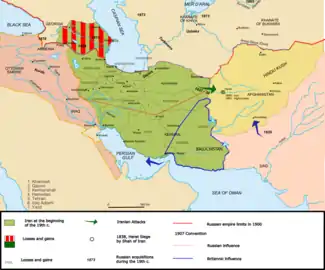Erdoğan Iran poem controversy
On December 10, during a visit to Baku, the capital of the Republic of Azerbaijan, to attend a victory parade celebrating the victory of Azerbaijan in Nagorno-Karabakh region and adjacent districts following a military conflict with neighboring Armenia, Turkish president Recep Tayyip Erdoğan read parts of a controversial poem.[1][2] It sparked tensions with neighboring Iran.
Poem and context


The poem of Bakhtiyar Vahabzadeh recited by Turkish president Recep Tayyip Erdoğan laments how the Aras River has separated Azerbaijani-speaking people in the Republic of Azerbaijan and Iran and is a symbol of the pan-Turkism doctrine, that seeks incorporation of the Turkic-speaking people of Iran.[3] The poem recited by Erdogan said: "“They separated the Aras River and filled it with rocks and rods. I will not be separated from you. They have separated us forcibly."[3] The poem infuriated Iranians as it reminds them of the Treaty of Turkmenchay (1828), which Qajar Iran was forced to sign with the Russian Empire which resulted in the cessation of swaths of lands in the South Caucasus to Russia.[3] The lands ceded by the treaty, which set the boundaries between Iran and Russia at the Aras River, now constitute large parts of the Republic of Azerbaijan and Armenia, and even parts of Turkey.[3] The Treaty of Turkmenchay continues to be viewed as a source of shame brought on Iran by the Qajar dynasty that ruled Iran until 1925.[3]
Reactions
As narrated by Al-Jazeera, after a video of Erdogan’s speech in Baku circulated online, Persian-language social media was awash with angry posts that demanded Iran give a resolute response.[3] Dozens protested in Tabriz (one of the largest cities in Iran populated by Azerbaijanis) in front of the Turkish consulate, and defended Iran’s territorial integrity.[3] On social media, many Iranians quoted Sattar Khan, an important figure in the Iranian Constitutional Revolution, and who was of Azerbaijani origin.[3] Sattar Khan is considered a national hero in Iran as he always prioritised Iran's national integrity and soil above anything else.[3] On social media, Iranians were reportedly also united "in saying Erdogan must refer to Iran’s history, which spans thousands of years, before supporting separation."[3]
On 11 December, Iranian foreign minister Javad Zarif said via Twitter:[3]
Pres. Erdogan was not informed that what he ill-recited in Baku refers to the forcible separation of areas north of Aras from Iranian motherland. Didn't he realize that he was undermining the sovereignty of the Republic of Azerbaijan? No one can talk about our beloved Azerbaijan.
Iranian foreign ministry spokesman Saeed Khatibzadeh tweeted: "The Turkish ambassador was told that basing foreign policy on illusions is not wise", advising, as narrated by Al-Jazeera, Turkish officials to read history.[3] A vast majority of Iran's parliament members (225 out of 290), signed a statement which was subsequently read out loud on television, strongly condemning Erdogan's remarks.[3] According to the joint statement, the poem was considered "surprising and unnacceptable".[3] The Turkish government in response summoned Iran's envoy to protest against the remarks made by the Iranian government.[3]
According to the deputy speaker of parliament, Ali Nikzad: "Mr Erdogan, you have either not read history or wish to distort it".[3] The Tabrizi representative in the Iranian parliament, Mohammad Reza Mirtajodini, tweeted: "Erdogan has overstepped his boundaries and has apparently forgotten where he had turned to on the night of the 2016 coup!"[3]
According to Turkish presidential communications director Fahrettin Altun: "We condemn the use of offensive language toward our president and our country over the recitation of a poem, whose meaning has been deliberately taken out of context".[3] Altun added that "passionately reflects the emotional experience of an aggrieved people due to Armenia’s occupation of Azerbaijani lands (...) It does not include any references to Iran.[3] Nor is that country implied in any way, shape or form".[3] Turkish foreign minister Mevlüt Çavuşoğlu stated that "baseless and heavy statements made by Iran and aimed at our president are unacceptable".[3] Çavuşoğlu assured that "Erdogan fully respects Iran’s national sovereignty and territorial integrity".[3]
Aftermath
Days later, President Hassan Rouhani said that Iran can move beyond row with Turkey over the Erdoğan poem.[4] As narrated by Reuters, Rouhani told: "In my opinion, with the explanations (Turkish officials) gave, we can move beyond this issue, but the sensitivity of our people is very important".[4]
References
- "Azerbaïdjan: un poème suscite des tensions entre la Turquie et l'Iran". RFI (in French). 2020-12-12. Retrieved 2020-12-16.
- "İran'ın Ankara Büyükelçiliği: Çavuşoğlu ve Zarif görüştü, yanlış anlama giderildi". BBC News Türkçe (in Turkish). Retrieved 2020-12-17.
- Motamedi, Maziar. "Why did President Erdogan's poem infuriate Iranians?". www.aljazeera.com. Retrieved 2020-12-16.
- Reuters Staff (2020-12-14). "Rouhani says Iran can move beyond row with Turkey over Erdogan poem". Reuters. Retrieved 2020-12-16.
